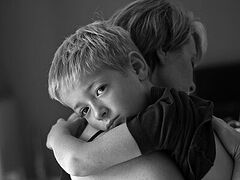 Archpriest Maxim Obukhov. Photo: rusk.ru
Archpriest Maxim Obukhov. Photo: rusk.ru
Archpriest Maxim Obukhov was known to many as the founder of the first-ever Crisis Pregnancy Center [in Russia] and an active pro-lifer. The center opened its doors back in 2000.
Here’s some background information. During Soviet times, abortion was treated lightly. Back then, standards of living were different, we had a different ideology, and the Church had no opportunity to actively fight against abortions. In the USSR, “the interruption of pregnancy” was made legal after Stalin’s death in 1953. In the majority of Western countries it was allowed after the Second World War, while in the United States, the right to have a “choice” was given to women in 1973.
In the early 1990s, the Russian Orthodox Church had the opportunity to carry out work aimed at protecting the lives of unborn children. The organization founded by Fr. Maxim Obukhov was one the first to work consistently in this area. It had its own printing house, and the center’s employees distributed millions of booklets, providing information throughout the entire country and even in neighboring countries.
Fr. Maxim wrote methodological instructions based on existing experience and the experience of colleagues in the West. These booklets are now available in both paper form and in digitized archives; a new methodological publication by Fr. Alexiy Tarasov from the town of Volzhsky was published in 2007. It expands on the ways of providing help during a crisis pregnancy and how to conduct a conversation with those who apply there. A hotline was organized. After the first two years of operation, it became clear that the hotline was a success. Despite the difficulties, there were positive results! Gradually, such centers appeared in different regions across Russia.
He was saying that if they could dissuade one out of ten women who came to the center from having an abortion, they’d have achieved a result
Father Maxim was realistic about the existing situation and the center’s capabilities. He was saying that if he could prevent one out of ten women from having an abortion, that would be a good result. It justifies the work of the organization and therefore it’s worth continuing such work.
You can judge the work of the Center by the statistics: So many people have visited and so many have received help there, but it’s the real-life examples rather than the cold hard data that make a great impression. Father Maxim comments:
“In the course of the center’s work, an obvious trend has emerged: people who have been dissuaded from having an abortion remain forever grateful to us. No matter how hard it was for them to raise the child, they were grateful. No one has ever said, “We wish we hadn’t listened to you, we should have terminated this pregnancy.”
At the beginning of the year, a married couple came to Fr. Maxim with an adult child, and they said:
“Here, look—this is our baby! Many years ago, you talked us into keeping the pregnancy and giving him life. And now he is a grown man, a student. We’re really happy we have him!”
Another story: A girl from a troubled home, a difficult situation, an explosive relationship between parents who drink and cause a scandal. When she was fourteen, she came across a flyer from the crisis pregnancy center. Not only did she read it with interest, but she also got into the spirit of the work that saves babies’ lives. It doesn’t matter that her life didn’t turn out the way she wanted it to. But she gave birth to three children and never had an abortion! Her children are adults already. She was grateful that such a center existed, called Fr. Maxim often and kept in touch with him.
There was also a funny story. A girl came to see Fr. Maxim and tearfully asked him to call her mother and tell her that she was pregnant. Fr. Maxim could not turn her away. The girl’s mother literally exploded, taking out everything on the priest, regardless of the fact that he was only a mediator. She ended her fiery speech with the following: “It’s a scandal, she should have an abortion immediately!” The mother kicked her daughter out of the house, but she gave birth anyway.
How did the situation develop? At first, the mother urged her only daughter to kill the unborn baby—that is, her first grandchild—but later she somehow had a change of heart. Father Maxim told me:
“I learned that, after all, the young woman and her child were allowed to live in her mother’s apartment. The young mother called me to complain and ask what she was to do with her mother. The adult woman switched to a smothering-love mode. She never left her grandson’s side and fussed over him, never letting him go, taking care and looking after him. Simple as that; a short while ago she kept insisting upon abortion, but today she loves her grandson.”
There are also negative examples. One woman had a mental illness. Abandoned to her fate, with a combative personality and unable to start a family, but still physically capable of parenting a child, she did give birth to a child. At some point, she had to deal with the Child Protection Services, was investigated by the juvenile justice authorities, and later went through the pain of losing her parental rights...
Batiushka explained it as follows:
“People with minor psychiatric disorders cannot manage their lives, they frequently get into crises and trouble—they get sick or become injured for no reason at all, they lose and forget things, they start fires and, in general, they end up in a desperate situation. On top of that, they often give birth out of wedlock (it’s worth noting that they give birth to mentally healthy babies). These women cannot change, and the people around them must accept them as they are. They need a certain amount of social support and ‘life guidance’, so we try to help them...”
Then there’s another situation. A single mother of three is in trouble—she is homeless. The center tries to offer some assistance; the government’s maternity funding isn’t enough to purchase a place to live, except perhaps in a remote village where it would be impossible to raise children. However, Fr. Maxim thought that this example was just as enlightening as it was negative. Even so, the woman gave life to her children and they all loved each other, but the situation is difficult because of the housing problem.
Fr. Maxim saw this as the way out of the housing problem:
“We have empty villages and townships; houses there become vacant and get cheaper with every passing day, only to be sold later for a song. We could build cheap houses using well-known modern technology. It’s quite cheap and quick. To provide several thousand families per year with free housing is a feasible and attainable goal in our country. Moreover, the budget has a tax collection surplus of ten billion rubles which is currently used to cover the cost of abortions and dubious IVF operations. If these funds were used to build inexpensive housing for women who have recently given birth and need a roof over their heads, it would change the existing situation for the better. The arithmetic is simple: one house costs one million rubles, so for ten billion rubles we would have ten thousand homes a year. But, unfortunately, in reality, it happens that ten billion rubles are simply put to waste.”
Fr. Maxim will be remembered not as someone who condemned, criticized, or lectured, but as someone who showed love and compassion and offered a helping hand to women who found themselves in a difficult situation. He said repeatedly:
“We can’t judge a child born out of wedlock and raised by a single mother. It may be true that the women who applied to the center have found themselves in dubious situations. But the child is not responsible for that! Every child’s life is priceless. All the more so since our demographic situation is so bad...”
When I asked him how he was able to dissuade women from having abortions, batiushka emphasized that we shouldn’t expect the women who come to the center to be religious. Therefore, the argument that the “Church doesn’t allow abortions” doesn’t work. If this logic had worked for them, they would not have come to the idea of getting rid of the pregnancy. But the Center deals with those who plan to do just that. Women have arrived at the thought of having an abortion, and they see it as a way out of a challenging situation; it means they see the reasoning of the believers as something that’s too difficult to grasp. We can, of course, talk about religion, but in general, we have to make do with using other arguments.
We should handle it differently: we try to explain that it is too bad for their health and appeal to universal human values. We can say, for example: Wouldn’t you take pity on a kitten and never get rid of it drown it ? Or, would you throw away a puppy? We even have the Animal Rights Society. So, why do we get rid of a baby (who hasn’t even been born yet)? There is, of course, the awakening of maternal instincts. This is a more challenging area. It also works, but it happens that pregnant women who come for abortion often lack maternal instincts. Otherwise, they wouldn’t have sought an elective termination of pregnancy. But Fr. Maxim was confident that these instincts awaken even after the baby’s birth.
A woman who holds her baby in her hands manifests what the Lord and nature have given her
“She had no instincts before, they simply didn’t exist, and then, once the baby arrives into the world, the mother takes care of him—and her instincts come alive in full force. As she breastfeeds, she begins to develop what should develop naturally; it’s a natural phenomenon. A woman holding a baby manifests what the Lord and nature have put into her. The maternal instinct begins to work in our favor,” argued Fr. Maxim.
Fr. Maxim was genuinely glad there were more positive examples and achievements in the center than failures or problems. According to his observations, as a rule, the lives of women who come to the center for help usually change for the better after the birth of a child. They don’t live in isolation, so they settle down and find a job. There are kind people out there. Of course, some women are too shy to ask for help, but usually there are a lot of good people willing to share and offer a helping hand in the least embarrassing way.




